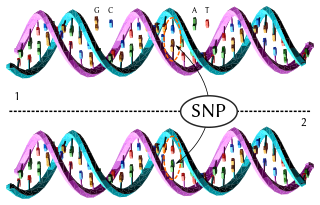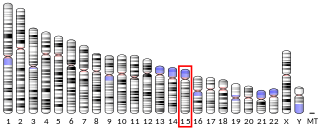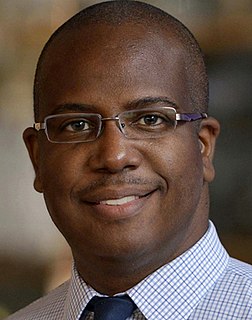Related Research Articles
A genetic screen or mutagenesis screen is an experimental technique used to identify and select for individuals who possess a phenotype of interest in a mutagenized population. Hence a genetic screen is a type of phenotypic screen. Genetic screens can provide important information on gene function as well as the molecular events that underlie a biological process or pathway. While genome projects have identified an extensive inventory of genes in many different organisms, genetic screens can provide valuable insight as to how those genes function.

In genetics, a single-nucleotide polymorphism is a germline substitution of a single nucleotide at a specific position in the genome. Although certain definitions require the substitution to be present in a sufficiently large fraction of the population, many publications do not apply such a frequency threshold.
The International HapMap Project was an organization that aimed to develop a haplotype map (HapMap) of the human genome, to describe the common patterns of human genetic variation. HapMap is used to find genetic variants affecting health, disease and responses to drugs and environmental factors. The information produced by the project is made freely available for research.

A DNA segment is identical by state (IBS) in two or more individuals if they have identical nucleotide sequences in this segment. An IBS segment is identical by descent (IBD) in two or more individuals if they have inherited it from a common ancestor without recombination, that is, the segment has the same ancestral origin in these individuals. DNA segments that are IBD are IBS per definition, but segments that are not IBD can still be IBS due to the same mutations in different individuals or recombinations that do not alter the segment.
Genetic association is when one or more genotypes within a population co-occur with a phenotypic trait more often than would be expected by chance occurrence.

Human genetic variation is the genetic differences in and among populations. There may be multiple variants of any given gene in the human population (alleles), a situation called polymorphism.
The common disease-common variant hypothesis predicts that common disease-causing alleles, or variants, will be found in all human populations which manifest a given disease. Common variants are known to exist in coding and regulatory sequences of genes. According to the CD-CV hypothesis, some of those variants lead to susceptibility to complex polygenic diseases. Each variant at each gene influencing a complex disease will have a small additive or multiplicative effect on the disease phenotype. These diseases, or traits, are evolutionarily neutral in part because so many genes influence the traits. The hypothesis has held in the case of putative causal variants in apolipoprotein E, including APOE ε4, associated with Alzheimer's disease. IL23R has been found to be associated with Crohn's disease; the at-risk allele has a frequency 93% in the general population.

In genomics, a genome-wide association study, also known as whole genome association study, is an observational study of a genome-wide set of genetic variants in different individuals to see if any variant is associated with a trait. GWA studies typically focus on associations between single-nucleotide polymorphisms (SNPs) and traits like major human diseases, but can equally be applied to any other genetic variants and any other organisms.

Autophagy related 16 like 1 is a protein that in humans is encoded by the ATG16L1 gene. This protein is characterized as a subunit of the autophagy-related ATG12-ATG5/ATG16 complex and is essentially important for the LC3 (ATG8) lipidation and autophagosome formation. This complex localizes to the membrane and is released just before or after autophagosome completion.

The 1000 Genomes Project, launched in January 2008, was an international research effort to establish by far the most detailed catalogue of human genetic variation. Scientists planned to sequence the genomes of at least one thousand anonymous participants from a number of different ethnic groups within the following three years, using newly developed technologies which were faster and less expensive. In 2010, the project finished its pilot phase, which was described in detail in a publication in the journal Nature. In 2012, the sequencing of 1092 genomes was announced in a Nature publication. In 2015, two papers in Nature reported results and the completion of the project and opportunities for future research.

Chromodomain-helicase-DNA-binding protein 2 is an enzyme that in humans is encoded by the CHD2 gene.
Elaine R. Mardis is the co-executive director of the Institute for Genomic Medicine at Nationwide Children's Hospital, where she also serves as the Nationwide Foundation Endowed Chair in Genomic Medicine. She also is professor of pediatrics at the Ohio State University College of Medicine. Mardis’s research focuses on the genomic characterization of cancer and its implications for cancer medicine. She was part of the team that reported the first next-generation-based sequencing of a whole cancer genome, and participated extensively in The Cancer Genome Atlas (TCGA) and the Pediatric Cancer Genome Project (PCGP).
Genomic structural variation is the variation in structure of an organism's chromosome. It consists of many kinds of variation in the genome of one species, and usually includes microscopic and submicroscopic types, such as deletions, duplications, copy-number variants, insertions, inversions and translocations. Originally, a structure variation affects a sequence length about 1kb to 3Mb, which is larger than SNPs and smaller than chromosome abnormality. However, the operational range of structural variants has widened to include events > 50bp. The definition of structural variation does not imply anything about frequency or phenotypical effects. Many structural variants are associated with genetic diseases, however many are not. Recent research about SVs indicates that SVs are more difficult to detect than SNPs. Approximately 13% of the human genome is defined as structurally variant in the normal population, and there are at least 240 genes that exist as homozygous deletion polymorphisms in human populations, suggesting these genes are dispensable in humans. Rapidly accumulating evidence indicates that structural variations can comprise millions of nucleotides of heterogeneity within every genome, and are likely to make an important contribution to human diversity and disease susceptibility.

David Matthew Altshuler is a clinical endocrinologist and human geneticist. He is Executive Vice President, Global Research and Chief Scientific Officer at Vertex Pharmaceuticals. Prior to joining Vertex in 2014, he was at the Broad Institute of Harvard and MIT, and was a Professor of Genetics and Medicine at Harvard Medical School, and in the Department of Biology at Massachusetts Institute of Technology. He was also a faculty member in the Department of Molecular Biology, Center for Human Genetic Research, and the Diabetes Unit, all at Massachusetts General Hospital. He was one of four Founding Core Members of the Broad Institute, and served as the Institute's Deputy Director, Chief Academic Officer, and Director of the Program in Medical and Population Genetics.
Joseph D. Buxbaum is an American molecular and cellular neuroscientist, autism researcher, and the Director of the Seaver Autism Center at the Icahn School of Medicine at Mount Sinai. Buxbaum is also, along with Simon Baron-Cohen, the co-editor of the BioMed Central journal Molecular Autism, and is a member of the scientific advisory board of the Autism Science Foundation. Buxbaum is a Professor of Psychiatry, Neuroscience, and Genetics and Genomic Sciences. He is also the Vice Chair for Research and for Mentoring in the Department of Psychiatry at the Icahn School of Medicine at Mount Sinai.

Gonçalo Rocha Abecasis is a Portuguese American biomedical researcher at the University of Michigan and was chair of the Department of Biostatistics in the School of Public Health. He leads a group at the Center for Statistical Genetics in the Department of Biostatistics, where he is also the Felix E. Moore Collegiate Professor of Biostatistics and director of the Michigan Genomic Initiative. His group develops statistical tools to analyze the genetics of human disease.

Pamela Sklar was an American psychiatrist and neuroscientist. She was Chair of the Department of Genetics and Genomic Sciences and professor of psychiatry, neuroscience, and genetic and genomic sciences at the Icahn School of Medicine at Mount Sinai. She was also chief of the Division of Psychiatric Genomics at the Icahn School of Medicine at Mount Sinai. Sklar is known for her large-scale gene discovery studies in bipolar disorder and schizophrenia and for making some of the first statistically meaningful gene identifications in both mental illnesses.
Stacey B. Gabriel is an American geneticist and Senior Director of the Genomics Platform at the Broad Institute. With Eric Lander, she is also the co-director of the National Human Genome Research Institute's sequencing center at the Broad Institute. She was named the "hottest researcher" on Thomson Reuters' list of the World's Most Influential Scientific Minds in 2014. She was given this honor because she published twenty-three of the most cited papers of 2013, more than any other single researcher recorded by Thomson Reuters. She topped the same list again in 2015. She is also an ISI Highly Cited Researcher.
Protein-truncating variants (PTVs) are genetic variants predicted to shorten the coding sequence of genes, through ways like a stop-gain mutation. PTV is sometime categorized under the umbrella term frameshift or truncating variants (FTVs), which includes both PTVs and DNA variants caused by frameshift mutation.

Neil Hanchard is a Jamaican physician and scientist who is clinical investigator in the National Human Genome Research Institute (NHGRI), where he leads the Childhood Complex Disease Genomics section. Prior to joining NHGRI, he was an associate professor of molecular and human genetics at the Baylor College of Medicine. He is a fellow of the American College of Medical Genetics and Genomics,. Hanchard's research focuses on the genetics of childhood disease, with an emphasis on diseases impacting global health.
References
- ↑ "Unique Finnish genomics scene attracts top US scientist to University of Helsinki | University of Helsinki". University of Helsinki. 2018-02-07. Retrieved 2018-11-19.
- ↑ "Mark Daly - Broad Institute". Broadinstitute.org. 2015-06-29. Retrieved 20 July 2017.
- ↑ Daly, Mark J.; Rioux, John D.; Schaffner, Stephen F.; Hudson, Thomas J.; Lander, Eric S. (1 October 2001). "High-resolution haplotype structure in the human genome". Nature Genetics. 29 (2): 229–232. doi:10.1038/ng1001-229. PMID 11586305. S2CID 9619343.
- ↑ Mark J. Daly, Jeffrey C Barrett; et al. (1 June 2008). "Genome-wide association defines more than 30 distinct susceptibility loci for Crohn's disease". Nature Genetics. 40 (2): 955–962. doi:10.1038/ng.175. PMC 2574810 . PMID 18587394.
- 1 2 "ASHG Honors Gonçalo R. Abecasis and Mark J. Daly with Curt Stern Award - ASHG". www.ashg.org. 2014-07-02. Retrieved 4 August 2017.
- ↑ "1612 Highly Cited Researchers (h>100) according to their Google Scholar Citations public profiles - Ranking Web of Universities". www.webometrics.info. Retrieved 4 August 2017.
- ↑ "National Academy of Medicine Elects 80 New Members". 2017-10-16.
- ↑ "Lens :: A New Way of Looking at Science -- Eric Lander: The great amplifier". www.mc.vanderbilt.edu. Retrieved 4 August 2017.
- ↑ Neale, Benjamin M.; Kou, Yan; Liu, Li; Ma'ayan, Avi; Samocha, Kaitlin E.; Sabo, Aniko; Lin, Chiao-Feng; Stevens, Christine; Wang, Li-San; Makarov, Vladimir; Polak, Paz; Yoon, Seungtai; Maguire, Jared; Crawford, Emily L.; Campbell, Nicholas G.; Geller, Evan T.; Valladares, Otto; Shafer, Chad; Liu, Han; Zhao, Tuo; Cai, Guiqing; Lihm, Jayon; Dannenfelser, Ruth; Jabado, Omar; Peralta, Zuleyma; Nagaswamy, Uma; Muzny, Donna; Reid, Jeffrey G.; Newsham, Irene; Wu, Yuanqing; Lewis, Lora; Han, Yi; Voight, Benjamin F.; Lim, Elaine; Rossin, Elizabeth; Kirby, Andrew; Flannick, Jason; Fromer, Menachem; Shakir, Khalid; Fennell, Tim; Garimella, Kiran; Banks, Eric; Poplin, Ryan; Gabriel, Stacey; DePristo, Mark; Wimbish, Jack R.; Boone, Braden E.; Levy, Shawn E.; Betancur, Catalina; Sunyaev, Shamil; Boerwinkle, Eric; Buxbaum, Joseph D.; Cook, Edwin H.; Devlin, Bernie; Gibbs, Richard A.; Roeder, Kathryn; Schellenberg, Gerard D.; Sutcliffe, James S.; Daly, Mark J. (4 April 2012). "Patterns and rates of exonic de novo mutations in autism spectrum disorders". Nature. 485 (7397): 242–245. Bibcode:2012Natur.485..242N. doi:10.1038/nature11011. PMC 3613847 . PMID 22495311.
- ↑ Samocha, Kaitlin E.; Robinson, Elise B.; Sanders, Stephan J.; Stevens, Christine; Sabo, Aniko; McGrath, Lauren M.; Kosmicki, Jack A.; Rehnström, Karola; Mallick, Swapan; Kirby, Andrew; Wall, Dennis P.; MacArthur, Daniel G.; Gabriel, Stacey B.; DePristo, Mark; Purcell, Shaun M.; Palotie, Aarno; Boerwinkle, Eric; Buxbaum, Joseph D.; Cook Jr, Edwin H.; Gibbs, Richard A.; Schellenberg, Gerard D.; Sutcliffe, James S.; Devlin, Bernie; Roeder, Kathryn; Neale, Benjamin M.; Daly, Mark J. (1 September 2014). "A framework for the interpretation of de novo mutation in human disease". Nature Genetics. 46 (9): 944–950. doi:10.1038/ng.3050. PMC 4222185 . PMID 25086666.